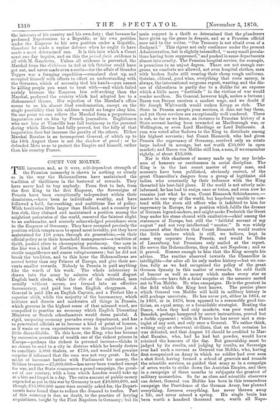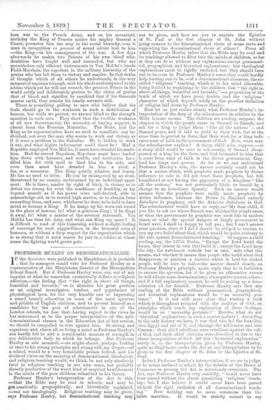COUNT VON MOLTKE.
THE immense, and, as it were, self-dependent strength of the Prussian monarchy is shown in nothing so clearly as in the way the Hohenzollerns have maintained the tradition of thriftiness in the bestowal of rewards. They have never had to buy anybody. From first to last, from the first King to the first Emperor, the Sovereigns of Prussia have been exceptionally independent within their dominions,‚ÄĒhave been as individuals wealthy, and have followed a bold, far-reaching, and ambitious line of policy. With territories little larger than Holland, and a country far less rich, they claimed and maintained a position among the mightiest potentates of the world, resented the faintest slight to an ambassador, and scarcely acknowledged precedence even in the Emperor of Germany. They have occupied precisely the position which tempts men to spend most lavishly, yet they have maintained for 150 years, through six generations,‚ÄĒin their official policy as in their household management‚ÄĒa tradition of thrift, pushed often to cheeseparing parsimony. One man in the line was a kind of Northern Bourbon, wasting wealth in sterile magnificence and coarse voluptuousness ; but he did not break the tradition, and to this hour the Hohenzollerns are served better than any Princes of Europe, and give their ser- vants smaller rewards. Nobody in Prussia is paid anything like the worth of his work. The whole aristocracy is drawn into the army by salaries which would disgust English bank clerks, while the elite of the cultivated, men usually without means, are formed into an effective bureaucracy, and paid less than English clergymen. A General is paid like an English Captain, and a Prefect like a superior clerk, while the majority of the bureaucracy, which initiates and directs and moderates all things in Prussia, which governs in the highest sense of that misused word, are compelled to practise an economy which English Dissenting Ministers or Scotch schoolmasters would deem painful. A rigid, unsparing economy pervades every department, and has so penetrated officials as to become a kind of point of honour, as if waste or even expensiveness were in themselves just a little discreditable. To this hour, the King, who has become by successive accretions of wealth one of the richest princes in Europe‚ÄĒperhaps the richest in personal income‚ÄĒthinks it no shame to send to a city in distress which he keenly desires to conciliate 5,000 thalers, or ¬£750, and would feel genuine surprise if informed that the sum was not very great. In the midst of incessant battles with Parliament for money, the Schloss treasure‚ÄĒ¬£7,000,000‚ÄĒhas never been touched except for war, and the State commences a grand campaign, the great- est of our century, with a loan which London would take up at a bite and forget in a day. The extra amount of public money expended as yet in this war by Germany is not ¬£20,000,000, and though ¬£16,000,000 more were recently asked for, the Depart- ments have found time to reduce the demand to twelve. Part of this .economy is due, no doubt, to the practice of levying requisitions, taught by the First Napoleon to Germany; but its main support is a thrift so determined that the plunderers have given up the game in despair, and as a Prussian official once said to the writer, "Our Treasury is not afraid even of a dockyard." This rigour not only continues under the present Administration, but is slightly intensified, "many small pecula- lions having been suppressed," and pushed in some departments almost into cruelty. The Prussian hospital service, for example, is penurious to an unjust degree. There are not enough sur- geons, no comforts are allowed, not even hospital clothes, men with broken limbs still wearing their cheap rough uniforms. Quinine, chloral, good wine, everything that costs money, is always, the international surgeons report, wanting, and the dis- use of chloroform is partly due to a dislike for an expense which a little more "fortitude" in the victims of war would render needless. No General, however high, makes a fortune ; Baron von Dreyse receives a modest wage, and we doubt if Sir Joseph Whitworth would reckon Krupp as rich. The State in Prussia accepts your services, it does not buy them, and yet those services are exceptionally well rendered. There is not, so far as we know, an instance in Prussian history of a State servant having been rewarded as Marlborough was, or Wellington, or even Lord Hardinge or Lord Dalhousie. A sum was voted after Sadowa to the King to distribute among his highest servants ; but Count Bismarck, who had given Prussia the supremacy of Germany, received only an estate large indeed in acreage, but not worth ¬£50,000 in open market; and Baron von Moltke still less, a sum, if we remember rightly, of about ¬£15,000.
Nor is this chariness of money made up by any lavish- ness of honours or carelessness in social discipline. The King is in the last resort master of every man, and accounts have been published, obviously correct, of the great Chancellor's dangers from a group of legitimist old ladies, who constantly by their influence with the King thwarted his best-laid plans. If the world is not utterly mis- informed, he has had to resign once or twice, and even now he remains just what he was, Count Bismarck Schonhatisen,‚ÄĒ master in one way of the world, but hopelessly unable to con- tend with the stern old officer who is indebted to him for supremacy in Europe, for a position which fulfils the dreams of German legend-makers, and might make Frederick the Great leap under his stone shroud with exultation‚ÄĒchief among the statesmen of Europe, but still the "faithful servant of my august" and not very intellectual "master." It was widely rumoured after Sadowa that Count Bismarck would receive the little enclave which is still, we believe, kept in some way separate from Prussia, and would be Duke of Lauenburg, but Prussians only smiled at the report. He serves the Hohenzollerns, they said, not Napoleon ; and so it proved. Honour enough to him that the King accepts his advice. The routine observed towards the Chancellor is intelligible‚ÄĒfor after all he only makes history‚ÄĒbut we con- fess, fully as we had recognized the policy of the great German dynasty in this matter of rewards, the cold thrift of honour as well as money which makes every star so valuable‚ÄĒwe have felt a faint surprise at the measure meted out to Von Moltke. He wins campaigns. He is the greatest in the field which the King best knows. The precise place which General von Moltke will hold in military history is still perhaps uncertain. He has never yet, either in 1864, or in 1866, or in 1870, been opposed to a reasonably good tac- tician, an equal army, or a formidable strategist. Beating the Danes, when they had only muskets, was poor work ; and Benedek, perhaps hampered by secret instructions, proved but a feeble opponent ; while in France he has never met a stra- tegist of any sort, and only once a General. We rather think, writing only as observant civilians, that on that ocdasion he was defeated, and that August 16 should be credited to Mar- shal Bazaine, who, had he had but powder, would have retained the honours of the day. . But generalship must be judged by its results, and judging by results, no Sovereign ever had such a servant as General von Moltke, who, having first reorganized an Army in which no soldier had ever seen a shot fired, having formed a school of generals and remade the scientifia services, so guided that army as in a campaign of seven weeks to strike down the Austrian Empire, and then in a campaign of three months to subjugate the greatest of military monarchies. So far as close and scientific observers can detect, General von Moltke has been in this tremendous campaign the Providence of the German Army, has planned everything, foreseen everything, has never thrown away
a life, and never missed a spring. His single brain has been worth a hundred thousand men, worth all Napo- leon was to the French Army, and on his seventieth birthday the King of Prussia makes his mighty General a Count, promotes him one step in the social hierachy,---as it were in recognition en passant of sound advice lent to him ‚ÄĒthe King‚ÄĒin his management of the war. A few days afterwards he makes two Princes of his own blood who, doubtless have fought well and succeeded, but who are nevertheless only efficient instruments in Von Moltke's hands Field-Marshals, the superiors in the military hierarchy of the genius who has led them to victory and empire. In that realm of thought which of all others he understands, in the very moment of supreme triumph, with his whole soul subjected to the advice which yet he will not reward, the greatest Prince in the world, coldly and deliberately prefers to the claim of genius that of blood, and signifies to mankind that if his Generals master earth, they remain his family servants still.
There is something galling to men who believe that the tools should go to the workmen in such a distribution of honour, but while we protest, we are not blind to the strength manifest in such acts. They show that the terrible weakness of all new Governments, the necessity of buying support, is absent from the Prussian Monarchy. The State, and the King as its representative, have no need to conciliate any in- dividual, not even the man who seems to work out victory as if it were a problem in the Calculus. He is bidden to work it out, and what higher inducement could there be ? Had a Republic employed Von Moltke, it must have dreaded his ambi- tion. Had he served Napoleon, Napoleon must have loaded him down with honours, and wealth, and territories, have filled him fat with spoil to bind him to his side, and even then must have dreaded in. him a rival, a foe, or a successor. The King quietly admires and trusts. He has no need to bribe. He can be endangered by no rival, threatened by no enmity, undermined by no individual oppo- nent. He is there, master by right of birth, in victory as in defeat too strong for even the semblance of hostility, as far beyond assault as if his power were self-derived, able to acknowledge aid, or to reward high service, or to abstain from rewarding them, and sure, whicheveihe does, to be held to have acted as became a King. If he hangs up his worn-out sword in the place of honour, lo ! what a gracious King ; if he flings it away, lo 1 what a master of the severest statecraft. Von Moltke has done his duty, and what can King say more ? It is difficult to read of this Countship without a slight feeling of contempt for such niggardliness in the bestowal even of honours, or without a deep respect for the organization which is so strong that it need scarce be just to a soldier at whose name the fighting world grows pale.



































 Previous page
Previous page